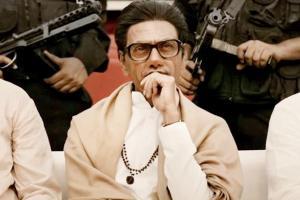Director Abhijit Panse's offering is an interesting drama for those who don't know much about Thackeray.

Nawazuddin Siddiqui in Thackeray
Thackeray
U/A: Biopic
Dir: Abhijit Panse
Cast: Nawazuddin Siddiqui, Amrita Rao
Rating:
ADVERTISEMENT
Rather than a biopic, Nawazuddin Siddiqui's Thackeray tends to become a hagiography that doesn't offer an insight into the larger-than-life personality that was Balasaheb Thackeray. If you've wondered what lay beneath this powerful leader, or how he rose when the odds were against him, be warned this film doesn't answer those questions. Which is not to say it doesn't work.
Director Abhijit Panse's offering is an interesting drama for those who don't know much about Thackeray. The protagonist's journey from being a cartoonist at a newspaper to becoming a ruthless leader, insistent on the progress of the Marathi manoos, is captured well. But is this movie an image makeover exercise for the party, which is at loggerheads with its long-time ally, the Bharatiya Janata Party, ahead of the Lok Sabha elections this year? It definitely feels so. Interestingly, while the film starts with a disclaimer which reads that the makers don't support violence in any manner, they haven't shied away from showing Thackeray as someone who was in favour of using violence as a means to instill peace.
The film opens with the leader's trial in a Lucknow court as he is being questioned about his role in the demolition of Babri Masjid. When he is asked about his supporters tearing down the mosque, he replies, "Nahi, nahi. Toda nahi, saaf kiya." The film then travels between Thackeray's past — stylishly shot in black and white — and the courtroom where he has to justify his deeds and decisions.
From the rise of the angry Marathi consciousness against the dominant South Indians in Mumbai to the killing of Krishna Desai, a member of the Communist Party, to Thackeray supporting the Emergency because he believes that the country would finally be disciplined — various chapters present the protagonist as a tyrant.
The problem, however, lies in the most important chapter — the '93 Bombay riots. The film skims over the matter, and shows it as a conspiracy to kill Thackeray rather than people avenging the post-Babri riots, as is popular knowledge. The storyline then leaps to the bomb blasts that shook the city, and unsurprisingly, Thackeray and the Shiv Sena, rather than being depicted as the instigators of the communal riots, are shown as the city's saviours.
Siddiqui is riveting as Thackeray. It is his terrific performance that makes you invested in the film even when it trudges down a predictable path. But he falters with his voice; he can't match the deep baritone of his subject. Amrita Rao is convincing as Meena Thackeray. The movie ends with the victory of the Sena-Bharatiya Janata Party alliance in the 1995 state elections; the makers also use the opportunity here to announce the sequel. Produced by Shiv Sena Member of Parliament Sanjay Raut, the film barely goes beyond being the audio-visual version of Sena's official newspaper.
Watch Thackeray Trailer
Catch up on all the latest entertainment news and gossip here. Also download the new mid-day Android and iOS apps to get latest updates
 Subscribe today by clicking the link and stay updated with the latest news!" Click here!
Subscribe today by clicking the link and stay updated with the latest news!" Click here!






